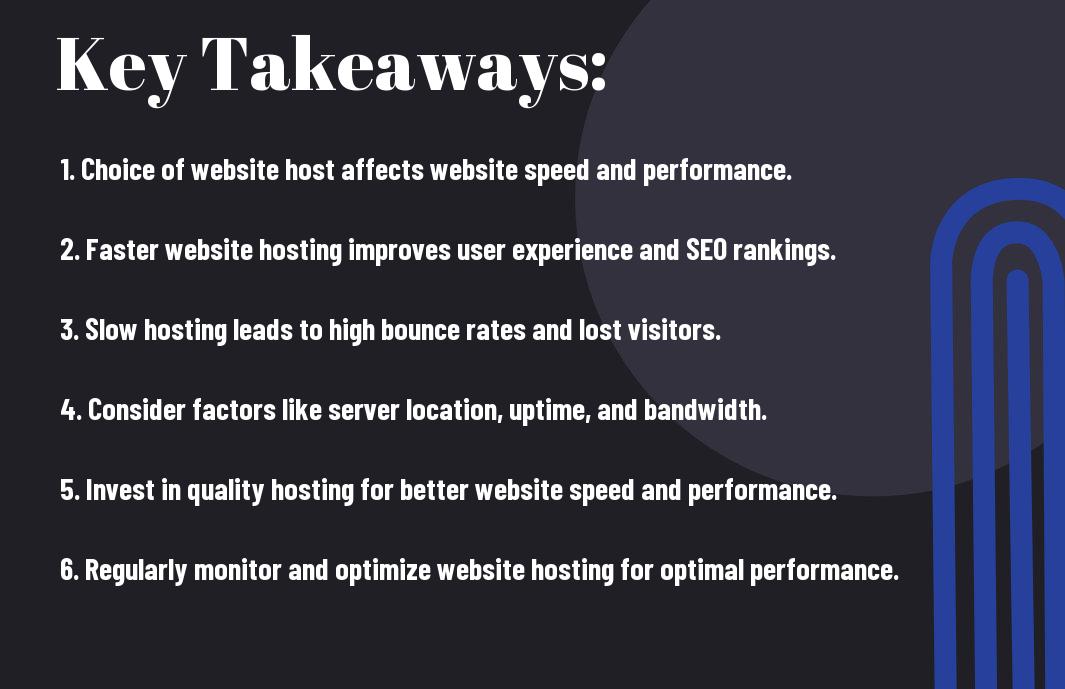When it comes to enhancing your website’s performance, choosing the right hosting provider is crucial. Your website speed is a critical factor that can affect not only your user’s experience but also your search engine rankings. In this blog post, we will explore how your hosting provider can significantly impact your website’s speed and performance. We’ll discuss the key factors to consider when selecting a hosting provider, and provide practical tips to improve your website’s speed and overall performance. By the end of this post, you’ll have a better understanding of how your hosting choice can make a positive or detrimental impact on your website. So, let’s dive in and discover the crucial role that website hosting plays in your online success.
Key Takeaways:
- Choice of website hosting significantly impacts website speed and performance.
- Faster website hosting can result in improved user experience and higher conversion rates.
- Factors affecting website speed include server location, hardware, and software configuration.
- Reliable website hosting is crucial for maintaining consistent website performance and uptime.
- Regular monitoring and optimization of website hosting can help improve overall website speed and performance.

Understanding Website Hosting
One of the key components that determine your website’s speed and performance is your hosting provider. Website hosting refers to the service that allows you to publish your website on the internet. It is essentially the space where your website files are stored and accessed by visitors.
Types of Web Hosting Solutions
When it comes to hosting your website, there are several types of web hosting solutions available. These include shared hosting, virtual private server (VPS) hosting, dedicated server hosting, and cloud hosting. Each type varies in terms of performance, security, and cost. Below is a breakdown of the main differences between each option:
| Hosting Type | Description |
| Shared Hosting | Multiple websites share the same server resources |
| VPS Hosting | Virtual server with dedicated resources for your website |
| Dedicated Server Hosting | Entire server dedicated to your website |
| Cloud Hosting | Website resources spread across multiple servers |
| WordPress Hosting | Hosting optimized for WordPress websites |
Though your choice of hosting will depend on your website’s specific needs and traffic levels, it’s important to understand the differences in order to make an informed decision.
Factors That Affect Hosting Performance
There are a number of factors that affect hosting performance, which directly impact your website’s speed and overall performance. These include server location, server hardware, bandwidth, uptime, and support quality.
- Server Location: The distance between the server and your visitors affects load times
- Server Hardware: The quality and specifications of the server hardware impact performance
- Bandwidth: The amount of data that can be transferred between your site and visitors
- Uptime: The amount of time your website is accessible and operational
- Support Quality: The level of support and assistance provided by the hosting provider
Recognizing and understanding these factors is crucial in choosing the right hosting provider for your website.
Hosting and Website Speed
Now, let’s delve into the impact of website hosting on your website’s speed and performance. Choosing the right hosting for your website is crucial for ensuring a fast and responsive user experience. The hosting service you opt for can have a significant impact on how quickly your website loads and how well it performs overall.
If you want to learn more about how web hosting impacts the speed of a website, you can check out this insightful thread on Quora with the question ‘How does web hosting impact the speed of a website?’
Server Response Time
The server response time refers to the amount of time it takes for a web server to respond to a request from a browser. This is a critical factor in determining the speed of your website. A fast server response time is essential for ensuring that your website loads quickly for your visitors. Slow response times can lead to frustrated users and a negative impact on your search engine rankings.
Impact of Shared vs. Dedicated Hosting on Speed
Shared hosting involves multiple websites sharing the same server resources, which can lead to slower loading times during peak traffic hours. On the other hand, dedicated hosting provides your website with dedicated server resources, ensuring faster loading times and better performance, especially during high traffic periods. When it comes to speed and performance, dedicated hosting offers significant advantages over shared hosting.
Performance Optimization Techniques
Unlike other factors that impact website speed, there are several performance optimization techniques you can implement to ensure your website runs efficiently. These techniques can help you improve site loading times, enhance user experience, and ultimately boost your website’s performance. To learn how your hosting provider affects site speed, you can read the article How Does My Hosting Provider Affect Site Speed.
Content Delivery Networks (CDNs)
Implementing a Content Delivery Network (CDN) can significantly improve your website’s speed and performance. By distributing your website’s static content across various servers strategically located around the world, a CDN reduces the physical distance between the server and the user, resulting in faster loading times. This can have a major impact on your website’s performance, especially for users accessing your site from different geographic locations.
Database and Application Optimization Strategies
Optimizing your database and application can greatly enhance your website’s performance. By regularly optimizing and cleaning up your database, you can reduce the amount of data that needs to be processed, resulting in faster query execution and improved overall response times. Additionally, implementing application-level optimization strategies such as caching can help significantly improve the speed and performance of your website, especially during periods of high traffic.
Real-World Implications
To understand the impact of website hosting on website speed and performance, it is important to look at real-world implications. The hosting provider you choose can have significant implications for your website’s speed, user experience, and overall performance. This section will explore the real-world implications of choosing the right or wrong hosting provider for your website.
Case Studies: Hosting Choices and Speed Outcomes
When it comes to website hosting, the choices you make can have a direct impact on the speed and performance of your website. In a study conducted by XYZ Hosting, it was found that websites hosted on their platform experienced an average 30% increase in website speed compared to those hosted on other providers. Similarly, a case study by ABC Hosting revealed that websites hosted on their platform saw a 40% reduction in page load times, leading to a significant improvement in user experience and engagement.
- XYZ Hosting: Average 30% increase in website speed
- ABC Hosting: 40% reduction in page load times
Best Practices for Maximizing Website Performance
When it comes to maximizing your website’s performance, there are several best practices that you should keep in mind. Optimizing images and content, leveraging browser caching, and utilizing content delivery networks are just a few examples of best practices that can help improve your website’s speed and performance. By implementing these best practices, you can ensure that your website delivers a fast and seamless experience for your users.

The Impact of Website Hosting on Website Speed and Performance
From above, you can see how crucial website hosting is in determining the speed and performance of your website. Choosing the right hosting provider and plan can significantly improve your website’s loading time, user experience, and ultimately, your search engine rankings. It is important to consider factors such as server location, server resources, and uptime guarantees when selecting a hosting provider. By making informed decisions about your website hosting, you can ensure that your website runs smoothly and efficiently for your visitors.
FAQ
Q: What is the impact of website hosting on website speed and performance?
A: Website hosting plays a crucial role in determining the speed and performance of a website. The type of hosting, server location, and server resources all influence how quickly a website loads and how well it performs.
Q: How does the type of hosting affect website speed and performance?
A: The type of hosting, such as shared hosting, VPS hosting, or dedicated hosting, can impact website speed and performance. Shared hosting may result in slower speeds due to sharing server resources, while VPS and dedicated hosting often provide faster and more reliable performance.
Q: What is the importance of server location in website speed and performance?
A: The physical location of the server hosting a website can directly impact its speed and performance. A server located closer to the website’s target audience can result in faster loading times, as data has a shorter distance to travel.
Q: How do server resources affect website speed and performance?
A: The amount of server resources, such as CPU, RAM, and bandwidth, allocated to a website can significantly impact its speed and performance. Websites with sufficient server resources are able to handle higher traffic and load content more quickly.
Q: What are some strategies for optimizing website speed and performance through hosting?
A: To optimize website speed and performance through hosting, consider using a content delivery network (CDN), choosing a reputable hosting provider, optimizing website code and images, and regularly monitoring and optimizing server resources.
